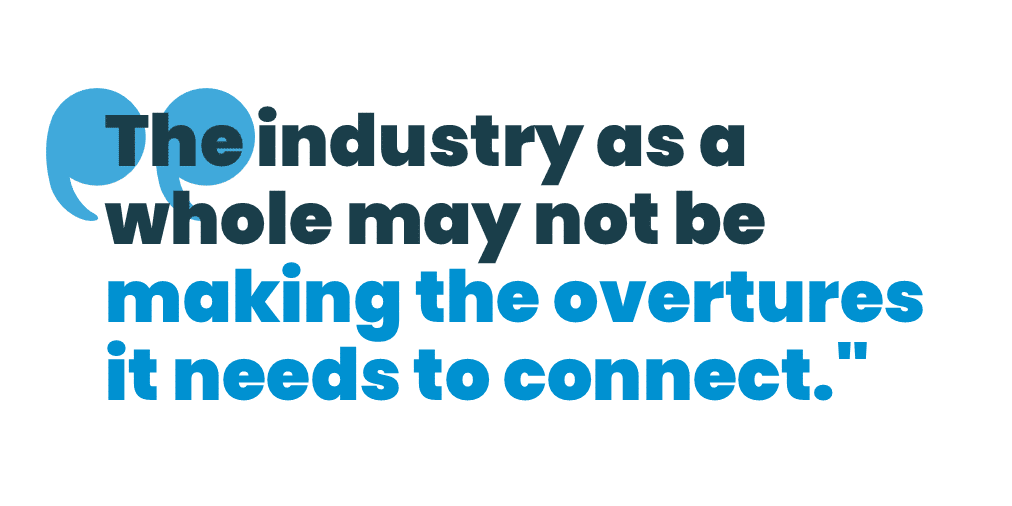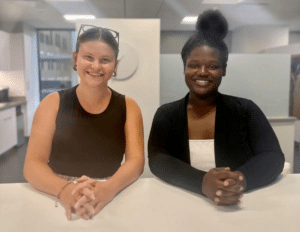
Gen Z and traditional investment providers: where, how will their paths even cross?
We can’t underestimate the work—and new thinking—required for the investment industry to meaningfully extend to Generation Z investors. That was my takeaway from a discussion this week with two Lowe Group college interns. Rosemary Cetera is a graduate student at Marquette University pursuing a Master of Arts in Corporate Communications, and Jamiah Boyd is a junior at the University of Wisconsin-Milwaukee majoring in finance with a minor in marketing and pursuing an entrepreneurship certificate.

Rosemary Cetera (left) and Jamiah Boyd
It was meant to be a light-hearted conversation intended to surface some insights for clients and readers on tuning their outreach. But the comments by these two students made an impression on me. Two points at the highest level:
- They’re so interested! More so than any younger generation I’ve encountered, there’s no need to sell them on either financial responsibility or wealth-building.
- It would be a mistake to assume the inevitability of established firms in serving younger generations. If you’re not where they are—and most traditional firms aren’t—they literally won’t know what they’re missing. The irony is that Rosemary and Jamiah acknowledge they don’t know enough about investing and say they yearn for a solid foundation, what most asset managers could readily provide, whether directly or via financial advisors.
Throughout our chat, I was struck by their description of how they piece information they’re interested in together, via Google searches and 25-second video clips. It seems harder than it needs to be for them.
Speaking to Rosemary and Jamiah was as if every survey I’d ever read about this generation had come to life (see sidebar).
“How typical do you think you two are?” I asked. Even though they intern for a financial communications agency, they believe they may be less engaged in the markets and investing than others in their circles of friends. Jamiah says some of her friends are up at 4 a.m. as the foreign markets open. “They’re in finance,” she offers by way of explanation.
While most of Rosemary’s friends are more engaged in “social issues that may cross over into finance,” her boyfriend, a biomedical engineering student, is super interested in stocks and investing.
It’s a personal sample of two, but here’s hoping you’ll find some insights in the excerpts below.
Money is a stressor
At a time in their lives when everyone tends to be short on cash, Rosemary, Jamiah and peers have the dubious distinction of being the first generation to have to worry about inflation in decades.
“Money means a different thing to our generation,” Rosemary says. “Money is definitely on our minds constantly. We're never going to be able to buy a house. We're never going to be able to own property. It’s a concept that's really difficult to grasp, that’s why we really need to get a handle on our finances.”
Jamiah explains, “We're trying to not just have money for today, we're trying to build generational wealth. I can use my money to either buy a 2017 Nissan Altima or I can use this money to invest in my first down payment that could make me a landlord.
“So, it's just a pick and choose of how we use our money to make more money.”
Influences and bite size bytes
Both women cite their mothers as having modeled financial responsibility at a young age.
Rosemary’s mom is an accountant. “I learned from a young age that retirement is important and savings are important,” she says. “When I started my internship, I was blessed to put money into a 401(k) and they asked me how much I wanted to put in. I said the max, as much as you can. From when I was 16 years old, I was always saving. Always putting away 75% of my paycheck when I could and 50% when I couldn't.”
Similarly, Jamiah quotes her mom as saying, “You never want to plan for the future when the future is tomorrow.”
Today her influences include two financial planners she follows on LinkedIn. One is a writer, a speaker at conferences and a contributor to the Financial Planning Association. “I follow them because they're doing some of the things I want to do,” she says.
The planners post money management, Roth IRA and other retirement planning tips, “making it really easy for college kids to understand how to do the basics.”
This focus on retirement from early 20-somethings surprised me so I had to ask, “Is it your intention not to touch the money until you’re 70½?”
“Well, I would try to plan ahead so I didn’t have to but maybe if I wanted to buy a home,” Jamiah immediately shot back, displaying her command of both IRAs and 401(k)s.
With few exceptions our interns are getting their information from social media—TikTok, Instagram, LinkedIn and X (previously known as Twitter) with screenshots from Reddit. In other words, it’s fast, it’s easily consumable and it’s graphic.
“If I watch a TikTok video and it’s 10-25 seconds and it’s good, then I’ll go deeper with a YouTube video that’s three minutes,” says Jamiah.
Somebody somebody sent
The women believe they’re more resistant to come-ons that fooled generations before them.
“Our generation is more aware of fake news, clickbait and scams,” says Rosemary. “We have selective media consumption. I don't just blindly follow finance creators because I don't know who's credible. Even though I want to learn more, I don't want to be led astray.”
As they describe their early years in a world they’re new to, it becomes apparent that their financial information-gathering has been shaped for them. Said another way, somebody or something somehow vouched for the source.
Why are they on LinkedIn? Both of their colleges required LinkedIn participation starting in freshman year.
Why did Rosemary (and millions others) sign up for Robinhood (but then never seriously use)? “My roommate said, ‘If I refer you, I’ll get $50’ so I said OK.”
Why is Jamiah familiar with one financial services brand? Because they sponsored music festivals and other events in her community.
And, why aren’t they even coming into contact with traditional providers’ investment content? This conversation leads me to believe that the industry as a whole may not be making the overtures it needs to connect.
“This conversation leads me to believe that the industry as a whole may not be making the overtures it needs to connect.”
“They’re just not in our path,” says Jamaiah. And, Rosemary adds, seemingly at a loss, “If [traditional providers] are not coming up in an algorithm, how would we even see it? Would we be asking questions on Google? But if we don't know what questions to ask, how would we even see them?”
These two, and likely their peers, will not be darkening the door to your home page. To even register on their radar, you may have to go out of your way to meet them where they are—with something right-sized for the medium.
Oh and just in case this needs to be said: Don’t even bother with television, radio or print.
Rosemary tells a quant story about being given a copy of the book Rich Dad, Poor Dad (first published in 1997) from her boyfriend, who first received it from his dad. That was the sole reference to the printed word in our conversation.
“I have all of my bills online. I don't get mail. I don't have any subscriptions and I don't pick up newspapers on the street. I just avoid it at all costs. I don't pick up flyers. I don't. That’s just not me. Everything is basically on my screen,” said Rosemary.
“Any advertisements that I would see physically in person, like on a billboard or on a bus, are not things that register with me as much as if it were on my phone from someone that I follow or like a page that I follow. Things I see on paper or printed, they don't seem like they're for me. It doesn't seem like that's something that I'm supposed to be paying attention to.”
Jamiah practically guffaws when I ask about print (which both repeatedly refer to as “hard copy” as if the canonical version is online).
“We hear about newspaper boys from maybe the 1990s,” says Jamiah, straining to be polite. “But that’s a dwindling thing. Paper is my grandmother. She still uses paper.”
Lowe Group offers a range of services related to digital marketing, send us a note for more information.
Subscribe.
Receive the latest news and insights from Lowe Group.